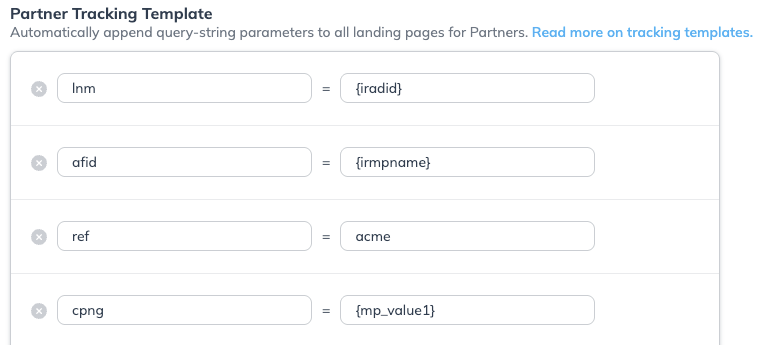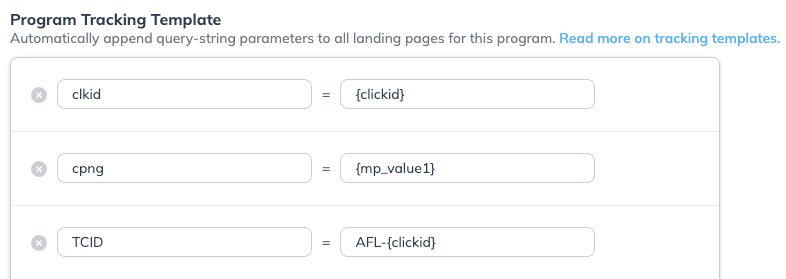This is where you can add global query string parameters to partner tracking links. If a click comes from a partner's tracking link, the parameters you establish in the template will be applied. This is a good place to add UTM Parameters. Learn how to Collect Campaign Data with Google Analytics using UTM parameters. Refer to the Query string parameters reference below for help.

Parameters with curly brackets ({}) are dynamic query strings that will automatically populate with a value when the link is clicked
Hardcoded values are supported—simply add a value without curly brackets ({}), and it will always be passed on a click.
Custom values are supported, however, we recommend contacting support to discuss how to use them.
Use underscores to add multiple parameters within a single query string.
URL Parameter
Example
Description
{CUSTOM}Custom
Use a custom dynamic query string parameter. impact.com recommends contacting support (or your CSM) to discuss your specific use case.
{clickid}2uz3sQWFlxyJRcqwUx 0Mo34VUkiyviUnPwZbQM0
Click ID
Unique ID assigned by impact.com associated with the click event. When a tracking link is clicked, this will populate with the unique click ID associated with the customer.
{iradid}828416
impact.com Ad ID
Unique ID associated with the ad that is associated with the click event. When a tracking link is clicked, this will populate with the Ad ID associated with the click.
{ircid}10306
impact.com Campaign/Program ID
Unique ID associated with your impact.com program (campaign). When a tracking link is clicked, this will populate with the campaign/program ID associated with the click.
{irpid}1234567
impact.com Partner ID
Unique ID assigned to the partner that drove the click. When a tracking link is clicked, this will populate with the partner ID associated with the click.
{iradname}My Ad
impact.com Ad Name
The name you've assigned to the ad that was associated with the click. When a tracking link is clicked, this will populate with the ad's name.
{iradtype}Banner
impact.com Ad Type
When you create ads in impact.com, you define the type of the ad (e.g., banner, text, image) before uploading creative. When a tracking link is clicked, this will populate with the ad type.
{iradsize}100x100
impact.com Ad Size
impact.com requires you to specify an ad's size. When a tracking link is clicked, this will populate with the size of the ad that you specified when it was created.
{prodsku}123ABC987
Product SKU
Unique SKU assigned to the product associated with the ad. When a tracking link is clicked, this will populate with the product SKU value associated with the ad.
{irmpname}CoyoteInfluencer
impact.com Partner Name
The name of the partner in impact.com. When a tracking link is clicked, this will populate with the partner's name associated with the click.
{irmptype}mediapartner
impact.com Media Type
This will return either mediapartner or mediasource depending where the click originated from—either from one of your partners, or from one of your media sources (such as traffic from a search engine).
{sharedid}Shared ID
Partners can append a Shared ID value as a query string parameter to their own tracking links, which is then visible to you in reporting. When a tracking link is clicked, this will automatically populate with the Shared ID a partner has specified, if available.
{mp_value1},{mp_value2},{mp_value3}Deal
Partner Custom Value
This will populate with a custom value you can assign to a partner. This setting is applied across your entire account, not just for a single Program/Campaign.
Custom values can be assigned to partners in Partners → Partners → Actions → Tracking. From here, you can define up to three custom values for each partner. These are most commonly used to label partners (e.g., influencer, Cashback/Loyalty, Deal, etc.).
You can also bulk upload and edit partner custom values in Partners → Partners → Bulk Edit. You will need an Excel or CSV file with the Partner IDs as well as the Partner Values themselves that you want to assign to that partner.
{timestamp}1598556546
Timestamp
Generates the UNIX timestamp when the click event occurred. When a tracking link is clicked, this will be appended as a query string parameter. This can be used as a cache-buster in some platforms.
{randint}1,234,567
Random Integer
Generates a random integer between 0–9,999,999 when a tracking link is clicked.
{impacttest}1
Test
Append this parameter when you test your tracking links.
{irmpgroupname}”influencers”,”preferred”
Group name
Lists one or multiple groups that a partner belongs to within a query string.
The various parameters specified for an ad in a program can sometimes lead to duplicate values being returned, especially when multiple parameters have the same name. Duplicate parameter values can create a discrepancy between impact.com's reporting and the reporting of your wider marketing team's tools, such as Google Analytics. To avoid this, impact.com considers only a single parameter value in the following order of priority (from highest to lowest).
This order prioritizes brand-specified parameters over partner-specified ones:
Parameter type | Description |
|---|---|
Ad landing page | The parameters you configure within your ad’s landing page metadata. (These parameters always take precedence unless a deep link is provided with the request, in which case deep link params override the landing page params.) |
Program tracking template | The parameters you configure under Settings → Gateway (found in the Tracking section) → Program Tracking Template. |
Partner gateway | The parameters you configure under Settings → Gateway (found in the Tracking section) → Program Tracking Template. |
Passthrough variable | The parameters that your partners can specify within a deep link, using the |
Deep link query string | The parameters that your partners can use to pass a deep link containing pre-defined landing page query string parameters. |
If the utm_medium parameter is appended to both the landing page deep link used by a partner and your own Program Tracking Template as shown below:
Deep Link URL:
https://brand.example?utm_medium=seoProgram Tracking Template:
https://brand.example?utm_medium=affiliateThe final landing page will be:
Program Tracking Template:
https://brand.example?utm_medium=affiliateThis is because the Program Tracking Template parameter was defined by you and is thus given a higher priority than the one defined by your partner.
